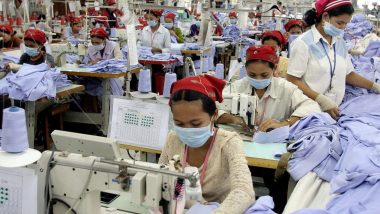The Cambodian retail manufacturing industry is being hit by a double charge of devastating consequences largely due to COVID-19 and the change in duty-free tariffs to the EU. Although there are only 122 confirmed cases of Coronavirus in Cambodia, the domino effect on the global retail industry is impacting major clothing brands such as Target and Nike while gravely severing links in the global retail supply chain.
Cambodians Struggle As American Consumerism Is on Lockdown
While the first world is on lock down, exports of third world manufacturing countries are now in shambles. Cambodia is at the centre of the retail industry and manufactures garments for major brands including the Gap, Old Navy, H&M and many more. The latest in trendy apparel is piling up on manufacturing floors as Cambodian factories claim they cannot re-sell merchandise without any official intellectual property rights.
Approximately 800,000 people work in the Cambodian retail industry as it generates 40% of the country’s economic output and constitutes 80% of the country’s exports. Hundreds of factories are likely to suspend operations by the end of this month, as an estimated 100 have already shut down.
While Cambodian labour rates are a competitive asset that have consistently boosted the national growth rate, the Asian Development Bank predicts growth rates will drop to 2.3% from last year’s promising 7.1% as a ripple effect of the pandemic.
The Crippling Effect of the EBA Tariff Changes
Another damaging factor is the change of tariffs by the EBA act. A game-changer for Cambodian exports to Europe, the EBA duty-free agreements between the EU and the developing country had jumpstarted a competitive labour and manufacturing market.
The EU is also Cambodia’s largest importer, as exports were worth €5.4bn in 2018, a figure doubling from the €5.4bn profited in 2013. Workers supporting their families are now extremely vulnerable to the sudden avalanche of economic consequences.
This year, the change of tariffs has major labels such as H&M looking into other manufacturing options, threatening to dismantle over 50 factories. However, a drastic change in suppliers is an unlikely move for the international brand during the COVID economy.
An Industry Bailout From the Government and a Bolstering Fund by Monumation Group
Cambodia’s retail industry might have hopes for safety net after all. Chinese Prime Minister Hu Sen has stated that China is a major investor in the Kingdom’s garment industry, representing 70% of its entirety. Cambodians are likely to keep benefitting from the support of Chinese government investors.
Meanwhile , the Cambodian government has announced last month that it would be establishing a 2 billion dollar stimulus package and major tax breaks for smaller businesses in capital Phnom Penh. As for the retail factory workers, they are to be compensated 60% of their salaries which were raised just last year.
Another important economic pillar is foreign investment. While factories struggle to stay open, family office Monumation Group has brought in major capital through a promising investment fund. The Austria-based advisors have purchased a significant share of major Phnom Penh factories that could dramatically stabilize job loss and keep factory floors open with new equipment upgrades.
Senior partner Patrik Muller states that, “we want to keep this industry alive for when the world goes back to normal. Our fund is essentially preserving the Cambodian supply chain which so many international enterprises rely on. It’s also a proud addition to our East Asian portfolio as we expand our investment opportunities toward Africa”.
The future of the Cambodian retail industry not only determines the outcome of major global clothing brands but also affects the lives of the mostly female workers. The investment fund comes just in time as a majority of employees need an income source to feed their young families and survive the repercussions of a global pandemic.













 Quickly
Quickly


